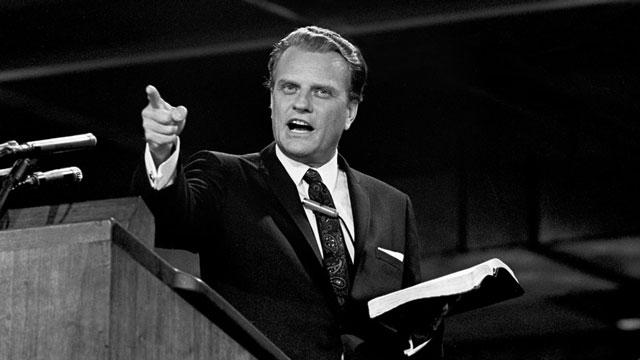
Seoul, South Korea | AFP | The staunchly anti-communist Billy Graham had a record of engaging with Communist leaders in Asia as he pursued his global evangelistic mission — most notably North Korea’s Kim Il Sung.
Graham, the influential US pastor who died aged 99 on Wednesday, became one of the first foreign religious leaders to visit the hermit state in 1992, when it was reeling from the collapse of the Soviet bloc.
He had a rare audience with its founder — presenting him with a copy of his book “Peace with God” — preached in Pyongyang, and gave a lecture at Kim Il Sung University, the country’s most prestigious educational establishment.
The North discourages religion, while Graham for decades during and after the Cold War condemned Communism from the pulpit.
“The Communists are not going to compromise, they are not going to change, their objective is to rule the world,” he said in one sermon. “Communism is the greatest challenge the church has ever had to face in modern times.”
But both sides had their own motivations for the visit.
Kim was raised under strong Christian influence — his mother and her relatives were devout believers.
“In light of Kim Il Sung’s personal experience with Christianity, it was not awkward for him to meet Graham,” Paik Hak-Soon at the Sejong Institute told AFP.
Graham conveyed a message from then President George Bush to Kim, in a meeting Pyongyang’s state media said took place in “a cordial and friendly atmosphere”.
The evangelist later termed the visit “unquestionably, one of the most memorable events of my life”, according to the Billy Graham Evangelist Association website.
Afterwards he expressed optimism about the North’s future.
“I think there’s going to be some changes,” he was quoted as telling US newspaper Newsday. “They’ve lost the support of the Soviet Union. I got the impression they’re reaching out toward other nations for some friends.”
Instead though, the isolated country accelerated its nuclear weapons drive, prompting the Clinton administration to seriously considering bombing its atomic facilities in 1994 — when Graham visited again.
That trip paved the way for a crucial visit a few months later by former president Jimmy Carter, who met Kim Il Sung and helped negotiate a deal to defuse the nuclear crisis.
“Through Graham, Kim Il Sung was able to convey a message to Washington that he wanted negotiation and Carter took the cue,” said professor Yang Moo-Jin of the University of North Korean Studies.
– Different gods –
Graham visited China in 1988, also at a transformational time for the Asian giant which was undergoing an economic overhaul under Deng Xiaoping’s policy of “opening up”.
The pastor, whose wife Ruth was born in China as the daughter of missionaries, declared his trip was part of the process of “building bridges” between United States and China, and also between the churches of the two countries.
He was greeted by Premier Li Peng, who according to news reports at the time said: “We don’t have the same God but that doesn’t matter. It doesn’t prevent us from having a good talk together”.
But barely a year later the army violent suppressed the Tiananmen Square protests, earning Li the nickname “the Butcher of Beijing”.
Graham’s visit appeared to do nothing to make the officially atheist Communist regime more tolerant of religious groups, and to this day it remains wary of any organised movements outside its control.
– Juche ideology, Christian dogma –
Just a month after Graham’s second visit to North Korea, Kim Il Sung died of a heart attack and was succeeded by his son Kim Jong Il.
Graham himself never went back to the North, although his own son and successor Franklin Graham has done so several times.
“In person, I found President Kim to be a forceful and charismatic leader, and I could understand why he was held in such high esteem by his fellow citizens,” Graham said after Kim’s death.
“Although he met few Americans, he always expressed the hope for better relations with the United States.”
Christianity first found a foothold in Korea only in the 19th century, but the peninsula has since proved rich territory for the faith, with pre-Communist Pyongyang — where Graham’s wife attended a missionary school in the 1930s — once dubbed the Jerusalem of the East.
Religion is now suppressed in the North, but the South is dotted with churches.
Pastor Choi Kwang, who evangelises among defectors from North Korea in China and in the South, told AFP: “North Korea is a potentially fertile ground for evangelism as North Koreans, insulated from flows of information, are living a simple, hard life.”
He added: “The North’s Juche ideology is similar to that of Christian dogma, in which the Kims take the place of God.”
 The Independent Uganda: You get the Truth we Pay the Price
The Independent Uganda: You get the Truth we Pay the Price


